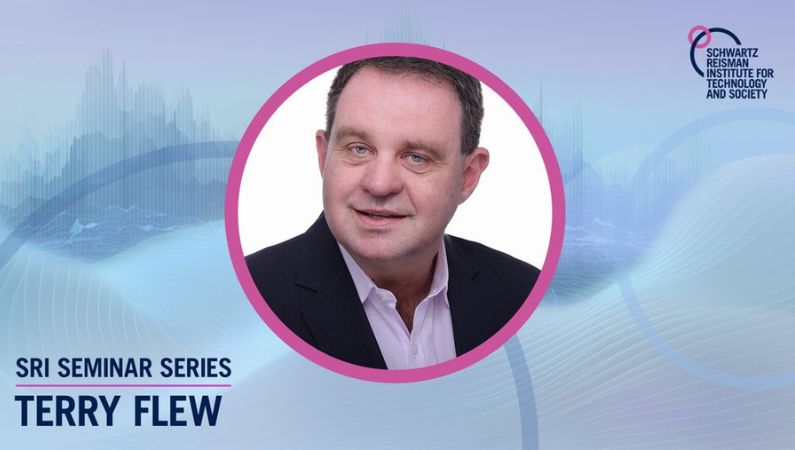
- This event has passed.
SRI Seminar Series: Terry Flew, “Trust and communication: The question of mediated trust”

Our weekly SRI Seminar Series welcomes Terry Flew, professor of digital communication and culture at the University of Sydney and the author of 16 books on the governance of digital media platforms. In this talk, Flew will explore issues surrounding public trust in media communications in the context of contemporary political polarization, disinformation, and digital economies, proposing an interdisciplinary framework for understanding questions of trust as they pertain to news media, digital platforms, corporations as institutions, and artificial intelligence. This session will be moderated by Beth Coleman.
Talk title:
Trust and communication: The question of mediated trust
Abstract:
The question of trust in media is one of the major questions of our times. The Edelman Trust Barometer has surveyed trust in media for over 20 years, and Gallup has surveyed trust in news since the 1970s. Debates about political polarization, hyper-partisanship, mis- and dis-information, and propaganda all point to questions about trust in media in general and news media in particular. With traditional media business models in a period of ongoing crisis, and the distribution of media content being subject to rapid change through digitization, platformization and social media, the historic “gatekeeper” roles of traditional media brands have been losing salience, and new modes of media content distribution, from citizen journalism to the “creator economy,” are on the rise.
At the same time, the engagement of communications as a discipline has been sporadic (Flew, 2021b). In contrast to fields such as sociology, political science, economics, and philosophy, trust as a concept and its relationship to communication has not been the subject of sustained engagement in communications. More often, it emerges in the context of specific external developments, such as former US President Donald Trump’s claims about “fake news,” arguments over fact-checking, or questions of political interference. Even then, trust tends to be subordinated to other concepts, such as truth and ideology. For example, Jürgen Habermas rarely refers to trust in his extended discussion of communicative rationality an its relationship to trust-telling, even though he acknowledges that the acceptance of statements as truthful is never fully a matter of their epistemic rationality, but rests upon subjective context of reception and perceptions of the speaker (Habermas, 2018).
This presentation will report upon a five-year Australian Research Council (ARC) Laureate Fellowship that Professor Flew is commencing titled Mediated Trust: Ideas, Interests, Institutions, Futures. Drawing upon a framework first proposed in Regulating Platforms (Flew, 2021a), the presentation will consider the question of whether there is a distinctive communications perspective on trust, and the development of an interdisciplinary framework for understanding questions of trust as they pertain to news media, digital platforms, corporations as institutions, and artificial intelligence.
About Terry Flew
Terry Flew is professor of digital communication and culture and Australian Research Council (ARC) laureate fellow at the University of Sydney. His books include The Creative Industries: Culture and Policy (SAGE, 2012), Global Creative Industries (Polity, 2013), Media Economics (Palgrave, 2015), Understanding Global Media (Palgrave, 2018), Regulating Platforms (Polity, 2021), and Digital Platform Regulation: Global Perspectives on Internet Governance (Springer, 2022). He was president of the International Communications Association (ICA) from 2019 to 2020, and is an ICA fellow, elected in 2019. He is a fellow of the Australian Academy of the Humanities (FAHA). In 2011–12, he chaired a review of the Australian media classification system for the Australian Law Reform Commission. Organizations he has advised include the OECD, Australian Communication and Media Authority, Cisco Systems, Special Broadcasting Service, Meta, and Telstra. His Australian Research Council laureate fellowship is a five-year study (2024-2028) of “Mediated Trust: Ideas, Interests, Institutions, Futures.” He also leads an ARC Discovery Project on “Valuing News: Aligning Individual, Institutional and Societal Perspectives” and the International Digital Policy Observatory, also funded through the ARC.
Registration
To register for the event, visit the official event page.
About the SRI Seminar Series
The SRI Seminar Series brings together the Schwartz Reisman community and beyond for a robust exchange of ideas that advance scholarship at the intersection of technology and society. Seminars are led by a leading or emerging scholar and feature extensive discussion.
Each week, a featured speaker will present for 45 minutes, followed by an open discussion. Registered attendees will be emailed a Zoom link before the event begins. The event will be recorded and posted online.

